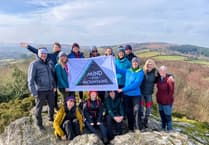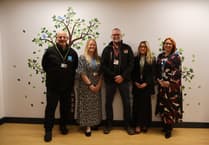AN investment of more than £170,000 is set to secure the future of a medieval Dartmoor longhouse considered unique in the country.
Higher Uppacott, at Poundsgate, first took shape in the 1300s, shortly after the Black Death had killed half the country's population.
It began as a single-storey stone-built hall, probably roofed with ferns and dug into the hillside to cheat the worst of the weather.
One end sheltered people and the other their livestock.
Window openings would have been tiny, keeping the interior dark, and with no glass available, only wooden shutters and semi-translucent animal skins would have helped to keep out the cold — but also more of the light.
An open fire was kept going on the earth floor in the centre of the dwelling end, smoke drifting up into the thatch, some of which remains blackened today.
A fireplace and chimney weren't added until the 16th century, nor proper upper rooms until the 17th century.
Eighteenth and 19th century farm buildings built adjoining the longhouse have since been converted into additional accommodation.
The shippon however, where the animals were kept, remains virtually untouched and partly accounts for Higher Uppacott's Grade One Listed status.
Now Dartmoor National Park Authority, with help from the Lottery-funded Moor Than Meets The Eye project, is setting about a number of essential maintenance projects.
Initially the aim is to make the buildings capable of withstanding Dartmoor's harsh climate.
Thereafter, subject to further funding being available, Higher Uppacott, which is owned by the DNPA, could be stripped of some of its modern trappings and become a national centre for longhouse study.
Andy Bailey, Moor Than Meets The Eye Community Officer, is excited.
'We want to stop Higher Uppacott decaying any further, get it re-thatched and get into a condition that ensures it's here for generations to come,' he said.
'We also want to present it in such a way that people can understand the medieval story it has to tell and use it to inform the exploration of wider Dartmoor.
'We want to provide better access.
'At the moment we have monthly visits or people can arrange private viewings but if we can encourage volunteers to look after this fabulous place maybe we can open on a more regular basis.'
Medieval specialist and broadcaster Dr Ian Mortimer lives in Moretonhampstead and is a Dartmoor National Park Authority member.
He is keen to reveal the jewel hidden within Higher Uppercott's historic walls.
'For being in touch with the middle ages, experiencing what they saw, experiencing the lack of light and understanding the way they lived, there's no better house in England you can visit,' he said.
'This is the only medieval peasants' house you can visit, it's only here you can understand how far they had to travel to church, the manor or market, get a sense of how far we've come.
'Also, if everything came to the worst, if civilisation came to an end, then this is how we should live again, actually we could survive.
'People thrived here, showed they could advance bit by bit, putting a porch on, installing a fireplace indoors, little advances made down the centuries.
'All in a place as remote as this, they were living really at the fringe of Christendom.
'When Spitchwick Manor was first mentioned in Domesday there were slaves here; that gives some idea of the huge cast of time and it's very difficult to get a real handle on that.
'This place is special because it speaks for the poor of England who were the vast majority.'
Perhaps the person with the greatest interest in Higher Uppacott's future is National Park ranger Bill Allen.
He has lived there for 15 years, originally in the longhouse and now in the later barn conversion.
'It's a real privilege,' he said.
'Yes it's built of granite so it's damp and a bit draughty with rattly windows.
'But when the medieval part was built they really knew what they were doing.
'I didn't keep animals here but my logs were stored under the same roof, there was a common sense simplicity about it.
'It's very easy to think of it as primitive, it's not, the people who built this worked with landscape, built into it, they didn't try to fight the elements; they overcame them, worked with them.
'It's a real pleasure to call it home, to come back here at the end of the day.'
Bill already welcomes visitors to Higher Uppacott, many of them children.
He's keen to see the educational opportunities maximised.
'The breadth of possibilities here is just fantastic, there's something for everybody,' he said.
Higher Uppacott can only be visited by appointment. For details call 01822 890414.
To take a virtual tour visit http://www.virtuallydartmoor.org.uk">www.virtuallydartmoor.org.uk





Comments
This article has no comments yet. Be the first to leave a comment.